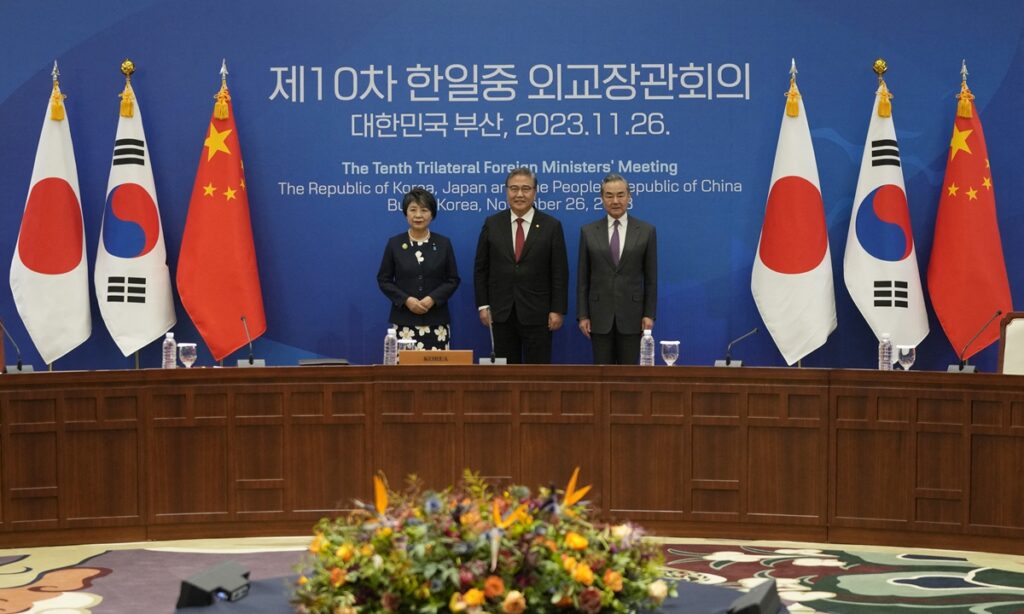China is willing to make efforts with both South Korea and Japan to promote the resumption of trilateral cooperation, Chinese top diplomat said at the trilateral foreign ministers’ meeting between China, Japan and South Korea which was held in the South Korean city of Bushan on Sunday.
The three sides agreed to create conditions for the trilateral meeting of the leaders of China, Japan and South Korea, and speed up preparations, according to a statement issued by China’s Ministry of Foreign Affairs on Sunday night.
Chinese experts believe the meeting, held after a hiatus of four years, will not only pave way for higher-level meetings between the three Asian countries, but will also inject stability in the region and shore up the three countries’ cooperation to offset the negative consequences of the current challenges from the global turmoil.
However, both Seoul and Tokyo are urged to take more actions and show sincerity if they want cooperation between the three countries to yield substantial results, Chinese experts said as there are still unsolved divergences that are plaguing trilateral ties. Meanwhile, extraterritorial forces are also seeking to use Japan and South Korea to contain China and seek to scuttle the trilateral cooperation. Experts said that inviting non-regional countries to interfere with regional issues is detrimental to cooperation, thus it is of vital importance for both Japan and South Korea to remain autonomous.
Chinese Foreign Minister Wang Yi, also a member of the Political Bureau of the Communist Party of China Central Committee, attended the trilateral foreign ministers’ meeting. This year marks the resumption of the trilateral foreign ministers’ meeting between China, Japan, and South Korea after a four-year hiatus, as close neighbors, China will continue to adhere to the principles of being friendly and cooperative with its neighbors and work together with South Korea and Japan to promote the resumption of trilateral cooperation, Wang was quoted by CGTN as saying.
Wang said that as important countries in the Asia-Pacific region, the three countries should base themselves on the peace and development of the Asia-Pacific region and the interests of its people, deepen regional cooperation, jointly address risks and challenges, and maintain regional peace and prosperity. He stressed that the three countries should oppose drawing ideological lines and resist regional bloc formation.
Beijing, Tokyo and Seoul should act as “stabilizers” for maintaining regional peace and security, practice a common, comprehensive, cooperative, and sustainable security concept, and insist on resolving differences and disputes through dialogue and peaceful means. They should also act as “pressure relief valves” for resolving hotspot issues, said Wang, noting that the continued tension on the Korean Peninsula is not in the interest of any party. The urgent task is to cool down the situation, create necessary conditions for restarting dialogue, and take meaningful actions to achieve it.
Before the trilateral meeting, Wang held meetings with South Korean Foreign Minister Park Jin and Japanese Foreign Minister Yoko Kamikawa on Sunday and Saturday respectively.
In his meeting with Park, Wang said China and South Korea are neighboring countries and this fact will never change. Both countries can benefit from a positive relationship, while both sides will suffer if the relationship deteriorates.
Wang also stressed that both sides should jointly resist the tendency to politicize economic issues, instrumentalize technological issues, and over-securitize economic and trade issues, in order to maintain stable and smooth supply chains and promote greater development in bilateral economic and trade cooperation.
Wang and Park exchanged views on the Korean Peninsula situation. Wang emphasized that China has always been a stabilizing force in the Northeast Asian and will continue to play a constructive role in easing the situation on the Korean Peninsula.
During a meeting with Kamikawa, Wang said China and Japan should earnestly implement consensus reached by leaders of the two countries to push forward bilateral relations along the right track of sound development.
Wang told Kamikawa that both sides should respect each other’s legitimate concerns. Japan should honor its commitments on the Taiwan question, strictly abide by the one-China principle and refrain from interfering in China’s internal affairs.
Noting that Japan’s discharge of Fukushima nuclear-contaminated water into the ocean concerns marine safety and public health, Wang said China opposes Japan’s irresponsible action.
Amid complicated international atmosphere, the trilateral foreign ministers’ meeting between the three major Asian countries can inject much needed stability in Northeast Asia; as well as deepen cooperation, exchange between the three countries to offset negative impact of current geopolitical tensions, Da Zhigang, director of the Institute of Northeast Asian Studies at Heilongjiang Provincial Academy of Social Sciences, told the Global Times.
Da noted the meeting between the three countries’ foreign ministers may pave way for higher-level trilateral meetings in the near future. It will also help to control current divergences among Beijing, Tokyo and Seoul, whilst expanding cooperation in areas where the three share common interests, he added.
Sincerity needed
Ties between the three countries have been frayed since the last trilateral meeting among the leaders of the three Northeast Asian nations was held in Chengdu, China, in 2019.
Historical issues such as Japan’s wartime atrocities during WWII, as well as current tussles like Japan’s irresponsible releasing of nuclear-contaminated wastewater from the crippled Fukushima Daiichi Nuclear Power Plant into the Pacific Ocean; Tokyo and Seoul’s role as US vassals in the region, continued to plague the ties.
South Korea and Japan are eager to mend ties with China not only because the prospect of cooperating with China is in line with their national interest, but the warming up China-US ties after a summit in San Francisco between leaders of the two countries earlier this month propelled Seoul and Tokyo to reach out, Lü Chao, an expert on the Korean Peninsula at the Liaoning Academy of Social Sciences, told the Global Times.
“As the international society is at a historic turning point as it faces major challenges and changes, we hope to discuss our strategic significance of Japan-China-South Korea cooperation,” Kamikawa told reporters Friday, according to a report from AP.
While meeting with UK Prime Minister Rishi Sunak and signing The Downing Street Accord last week, South Korean President Yoon Suk-yeol’s made remarks related to China’s Taiwan and the South China Sea. “China urges relevant parties to stop making irresponsible comments on issues bearing on China’s core and major concerns and be very prudent about what they say or do,” Chinese Foreign Ministry spokesperson Mao Ning said on Friday.
Similar to the US, Japan and South Korea tend to talk up cooperation with China whilst disrespecting China’s core interests, which create obstacles for the three to cooperate, said Lü. He noted that China is willing to meet Japan and South Korea half way to expand cooperation, but also won’t hesitate to strike back any unilateral crackdown on China and disrespectable remarks or behaviors that are against China’s core interest.
“For the three countries to pick up momentum in deepening cooperation, we need to see more actions, more sincerity from both Tokyo and Seoul,” Lü noted.
Extraterritorial threats
Although the easing of China-US ties partly stimulated Japan and South Korea’s willingness to reach out to China, Chinese experts believe a closer China-Japan-South Korea trilateral tie is will not make the US happy.
US President Joe Biden and the leaders of South Korea and Japan agreed at Camp David in August to deepen military and economic cooperation and made their strongest joint condemnation yet of “dangerous and aggressive behavior” by China in the South China Sea.
Da said that in recent years, the US has been plotting to work with its allies to create an Asian NATO, which extremely threatens regional stability.
In a forum held in Qingdao in July this year, Wang Yi urged that China, Japan and South Korea, as well as other Asian countries, should practice open regionalism, promote inclusive Asian values, cultivate strategic autonomy, safeguard regional unity and stability, resist the Cold War mentality, and avoid coercion by hegemony.
Asian countries should solve our differences by ourselves, while inviting extraterritorial powers to intervene is extremely detrimental to the stability and cooperation between China, Japan and South Korea, said Da, urging the two to remain autonomous.
He warned that those countries should learn from history that relying on non-regional countries to solve regional issues will eventually backfire, which will threaten the whole region.




